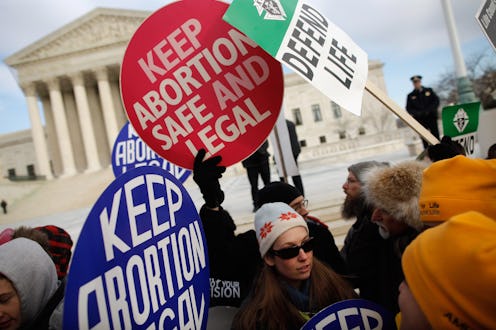News
The Senate Could Vote On The 20-Week Abortion Ban Sooner Than You Think

The Republican Party, fresh off the passage of a major tax cut for the corporate and upper classes, is now turning to another one of its signature, controversial issues: Its opposition to reproductive choice. Senate Majority Leader Mitch McConnell announced on Wednesday that the GOP Senate wants a national 20-week abortion ban, and it's hoping to get it to the floor for a procedural vote at the start of next week.
At present, women have a constitutionally protected right to receive an abortion, as laid out in the Roe v. Wade ruling of 1973. Over the years, however, Republican-led state governments throughout the country have gradually passed laws and regulations aimed at curtailing access to abortion, or criminalizing it when the fetus passes a certain gestational age. For example, there are currently already 21 states with 20-week abortion bans in effect.
The effort to pass a national 20-week ban, however, represents a new and more aggressive chapter in the Republican fight against women's reproductive freedoms. Just last week, Vice President Mike Pence ― a conservative Christian and an anti-abortion firebrand ― praised President Donald Trump's appearance at the annual March for Life, and referred to him as the "most pro-life president" in the country's history.
Trump himself called for the Senate to pass the ban, titled "The Pain Capable Unborn Child Protection Act," during the March for Life last week, promising to sign it into law. "I strongly supported the House of Representative’s Pain-Capable bill, which would end painful, late-term abortions nationwide," Trump told the assembled crowd. "And I call upon the Senate to pass this important law and send it to my desk for signing."
The bill, originally authored by South Carolina Sen. Lindsey Graham, has already cleared the House of Representatives. As such, it would only need to be passed by the Senate to head to Trump's desk for signature, assuming the Senate didn't make any changes to the bill.
McConnell is reportedly eyeing a procedural vote on Monday to advance the bill to the Senate floor. It's very unlikely to pass, however, as it would require 60 votes to break a Democratic filibuster. Some Republican senators, however, have recently been making noise about doing away with the filibuster entirely, a much-discussed move that would have huge implications for the flow of legislation going in and out of the Senate.
If the bill were somehow passed through the Senate and signed into law, it would almost certainly be the subject of legal challenges. How successful those challenges would be remains unclear, however, and pro-choice activists and advocates have sometimes acted cautiously about pressing their case via lawsuit. If a major abortion-related case were to end up before the Supreme Court, it could create a situation in which the core protections of Roe v. Wade could be further weakened or stripped.
As it stands now, the court continues to be comprised of four pretty reliable conservative and liberal justices, with Anthony Kennedy generally serving as the swing justice. Justice Neil Gorsuch was nominated and confirmed to the court last year, a conservative jurist who could prove hostile to abortion rights. He replaced the late, similarly conservative Justice Antonin Scalia, however, so the court's ideological balance did not really change.
A future vacancy would give Trump the opportunity to potentially remake the balance of the court for a generation, and make these sorts of legislative and legal battles around reproductive rights all the more perilous for pro-choice advocates. Although again, at least under the current Senate rules, the bill remains very unlikely to make it to Trump's desk ― it would require a whopping nine defecting Democrats for the 20-week abortion bill to be passed.